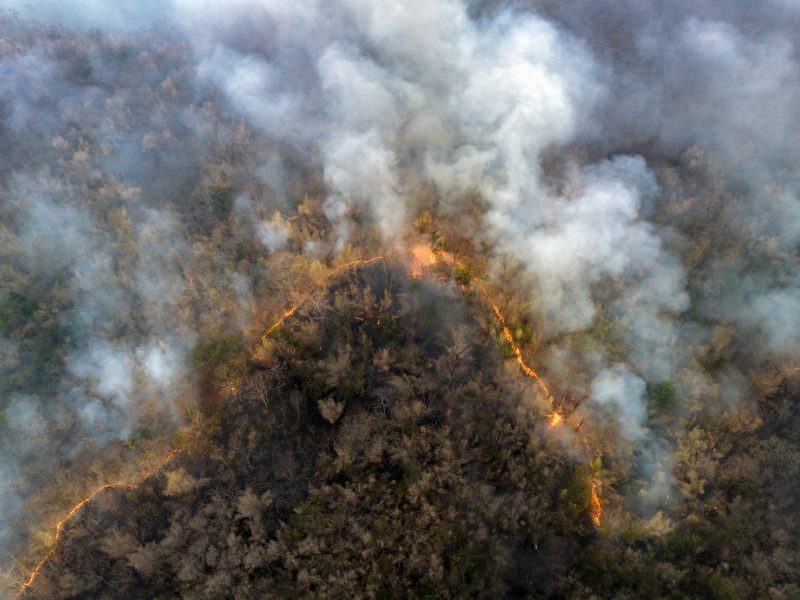More evacuations in Quebec as record breaking fires continue to burn

MONTREAL — Quebec’s wildfire season, which has forced thousands from their homes and left other communities on high alert, is the worst on record, officials said Wednesday.
Premier Francois Legault told reporters in Quebec City that the areas in the greatest danger were in northern Quebec and the neighbouring Abitibi region, where significant rainfall wasn’t expected until Monday. About 11,400 people have already been forced from their homes in the area because of persistent and unpredictable wildfires.
Residents shouldn’t expect to be able to return home before the middle of next week, Legault warned.
“I want us all to be realistic so that we don’t see things through rose-coloured glasses,” the premier said. “For the moment, we do not expect rain for the next few days.”
Evacuation orders were issued Tuesday night for the northern Quebec town of Chibougamau and the nearby Cree community of Ouje-Bougoumou.
The premier said the northern Cree community of Mistissini, located 550 kilometres north of Montreal, would likely be evacuated on Wednesday, resulting in another 4,000 displaced people.
But later in the day, Mistissini Chief Michael Petawabano said his community remains safe and asked residents to wait for instructions from Cree officials.
“I know it’s hard sometimes, panic may set in, but we would really appreciate if you would wait for our reports,” Petawabano said in a broadcast published on the community’s Facebook page. “Legault does not run our community.”
He said community leaders are in contact with Quebec’s forest fire prevention agency, SOPFEU, which is monitoring the fire.
Mistissini remains on alert he said, and the local clinic may consider moving some vulnerable people with health issues. He added that the school will close and he asked people to conserve gasoline and electricity because the fire has damaged a power line to the community.
The northern town of Chapais, Que., risked being evacuated again, and some parts of Senneterre, Que., were also threatened by the flames, Legault said.
Chapais Mayor Isabelle Lessard asked residents to be prepared to leave if the situation deteriorates, adding Wednesday that residents would be offered shelter in St-Felicien, Que., about 250 kilometres southeast. About 800 people from the town’s southern sector were forced from their homes for five days last week.
On Tuesday, Chibougamau Mayor Manon Cyr told the town’s roughly 7,500 residents to head to Roberval, Que. _ about 250 kilometres away — if they didn’t have friends or family elsewhere who could take them in. In Ouje-Bougoumou, about 800 people were ordered to leave and advised that shelter would be provided nearly 400 kilometres to the southeast, in Chicoutimi, Que.
In the Roberval area, residents used a Facebook page to find evacuees places to stay. Joanie Riendeau one of five volunteers running the page, said that by noon, there were only 40 people remaining at a temporary shelter in the Roberval arena, and that all of them had chosen to stay.
“In less than 16 hours after the evacuation notice, everyone was able to have a comfortable space to settle in,” she said in an interview.
While people’s property remains at risk, she said there’s been an outpouring of generosity from people in the area. “What we’ve gained in this catastrophe is a sense of solidarity,” she said.
One offer that stood out to her among the people offering up rooms in the homes to Chibougamau residents, was a man who offered space in his stable for 30 horses that had been brought from the evacuation zone. “It’s an enormous gift of generosity,” Riendeau said.
Quebec’s forest fire prevention agency said Wednesday more than 150 forest fires were burning and slightly under 100 of them were considered out of control. More than 457,000 hectares have burned so far this season, the most since the province started keeping records.
“In the history of (the agency) — nearly 50 years — we’ve surpassed the worst year on record,” Natural Resources Minister Maite Blanchette-Vezina said. “It’s a situation that’s unprecedented.”
Luc Dugas, with Quebec’s fire prevention service, said the situation is the worst he’s seen in his 23 years at the agency, adding that the fire season was far from over. Firefighters were focused on protecting communities and infrastructure but eventually would have to stamp out fires in isolated areas, he said.
“We’re going to need help all summer long, that’s for sure,” Dugas said.
There were about 520 fire personnel on Wednesday fighting fires in the province, helped by about 150 members of the Canadian Armed Forces, Legault said. They could cover about 40 fires at a time, he added.
Legault said he hoped to have 1,200 firefighters on the ground in the coming weeks, drawing from firefighters in New Brunswick and France in the coming days. He said the province was negotiating with the United States, Portugal, Spain and Mexico for additional resources.
The premier said the wildfires on the province’s north shore were under control, one day after residents of Sept-Iles, Que., were allowed to return home. As well, Legault said a Hydro-Quebec substation near Baie-Comeau, Que., was no longer under threat from fires.
Feature image by iStock.com/Toa55


